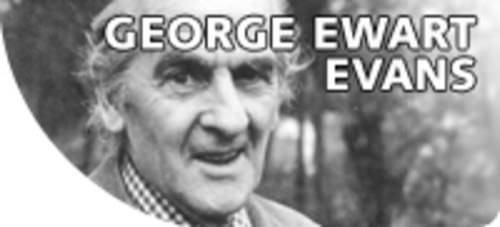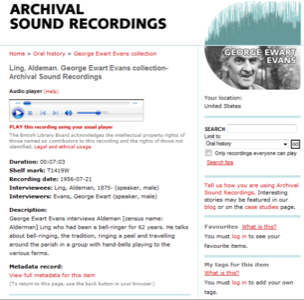George Ewart Evans, the pioneer of British oral history, collected 250 recordings of around 170 individuals born largely in the 1880’s and ’90s. That collection is now accessible online via the British Library, pioneers in their own right.

The George Ewart Evans Collection “document(s) rural life and agricultural work in the late nineteenth and early twentieth century, folk beliefs about animals, medicine and witchcraft, folk and popular songs.”
The recordings, made between 1956 and 1977, were interviews, primarily with farmers and other rural workers, in the English county of Suffolk, as well as some in Wales, Ireland and Scotland.

The recordings are, aptly I think, arranged by interviewee. There is a search field that allows a search in “oral history,” but unfortunately, there doesn’t seem to be a collection-specific search function.
If you register on the site, you can respond to a request that comes with every sound file,
“Can you tell us more about the context of this recording? Or can you share information on its content – timings of key sections or important details? Please add your notes. Uninformative entries may not be retained.”
In an email announcement Rob Perks, lead curator of oral history at the British Library, pointed out the oldest of George’s interviewees.
“The oldest are Aldeman Ling, born in 1875, discussing bell-ringing; George Messenger, born in 1877, who talks about threshing and about working on the barges at Snape in Suffolk; and Susan Mullenger, born in 1878, recorded in 1967 talking about eating fried mice as a remedy for whooping cough!”
To hear the voices of men and women talking about, say malting barley, men and women who were born 130 years ago and long gone, to hear the conversations between them and George, is to realize that history is no grand thing, a castle on a distant hill, but a real thing, something you can touch with your hands and hold in your mind, hear and see. It’s a real gift.

















